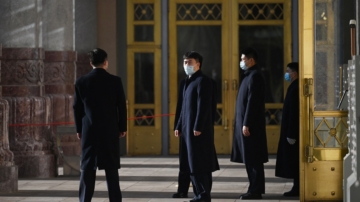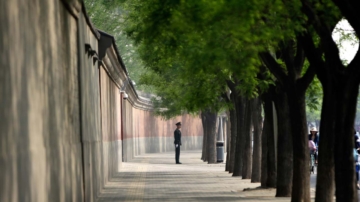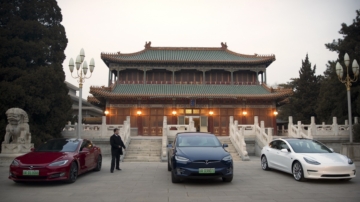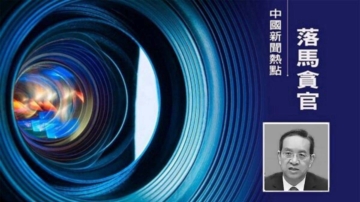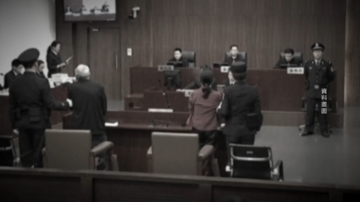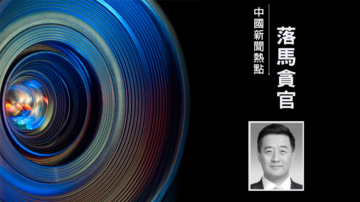【新唐人2013年04月02日訊】日前,英國媒體引述來自中國媒體的多個消息源透露,中共各級黨的宣傳部長都在傳達中共中央宣傳工作會議精神。有關會議定出了中共中央今後的5點宣傳基調,其中包括要求媒體緊遵所謂的「喉舌論」、禁止媒體反黨、反馬、列、毛等,而且對於那些「新三反人員」,如果不換立場就換人。消息迅速引發外界的關注及批評。
據《中華主流文化網》、《紅歌會網》報導,中共最近召開的宣傳工作會議上,媒體和媒體人員的宣傳基調和方向,成了會議的重要精神。
英國廣播公司《BBC》的報導,列出了有關會議定出的5點宣傳基調。
1、中國的新舊媒體,都應當是黨的喉舌和人民的喉舌。不允許媒體發出不同聲音,否則就收回經營權;
2、不允許反馬、列、毛言論公開的在媒體上出現;
3、堅持反黨、反國家、反民族立場的所謂「新三反人員」不能繼續待在媒體,如果他們堅持不換立場就換人;
4、要加強黨對媒體的管理和引導,不能讓它們總是報導負面東西;
5、不能讓有「新三反」傾向的人在高校從事新聞人才的培養工作。
對於這一消息的披露,外界討論熱烈。中國人民大學政治系教授張鳴在微博上質問,中央宣傳工作的新精神說反毛的人都得從媒體中清除。清除得了嗎?而且在今天這個時代,堅持毛的遺產,不僅是不合時宜的問題,而是跟人類為敵的問題。
不過也有觀點不相信中共真的能發出如此荒唐的通知。
《炎黃春秋》總編楊繼繩:「我們也是網上看到的,我們不知道,真的假的搞不清楚。可能是假的吧,否則不會那麼荒唐吧。不可能真的,那是倒退,倒退中國怎麼可能呢?」
時事評論員林子旭則指出,這五點宣傳基調,給人的第一感覺就是中共對輿論宣傳的管控已經力不從心了。
時事評論員林子旭:「即便是在十幾年前,中共不提也沒有人敢於公開批毛。這句話背後的潛臺詞就是,棄毛在中國社會已經成為大的趨勢,中共已經很難控制相關言論了,但是最起碼自己的喉舌不能跟著一起起鬨批毛。」
大陸法治三老之一的法學教授郭道暉,是原清華大學黨委常委兼宣傳部部長,他表示,所謂的反馬、列、毛這個提法,本身就不準確。
原清華大學黨委常委兼宣傳部長郭道暉:「甚麼叫反毛?評論毛澤東、毛澤東思想的一些錯誤也是必要的。馬、列、毛也不能搞在一塊,馬克思和列寧、毛澤東也有區別。特別是毛澤東晚年的錯誤,所以說反馬、列、毛這個概念不精確。要批評檢討這個教訓,這就是反嗎?一般甚麼叫反,這很難說的。我們也看到中宣部的這個指示。」
而對於不允許媒體發出與黨和人民利益相違背的聲音,以及要管控所謂的新三反人員,林子旭認為,這話講的很矛盾。
林子旭:「現在中共和國家、民眾的利益已經尖銳對立起來了,中共的這些黨棍恰恰是對國家、民族危害最大的人,媒體真的要是站在國家民族的角度進行報導,必然要觸及中共權貴階層的利益,說到底,其他的話都是陪襯,不要反黨才是這些基調的核心。」
不過,林子旭認為,新近中央宣傳工作會的講話,與其說是中共在發出命令,不如說它是在哀嚎。
林子旭:「現在的中國人、尤其是媒體人對外部世界了解的非常清楚,人心所向絕不是中宣部的這幾條規定所能阻擋得了的,中共現在連被稱為『看家狗』的喉舌媒體都管不明白了,更何況是數以億計的民眾之口。」
林子旭指出,現在中共對媒體的管控達到了一種臨界狀態,相信要不了多久,中共整個的輿論控制大堤就要決口了。
採訪/常春 編輯/王子琦 後製/李智遠
CCP's New “Three-Anti” Invites Criticism
Recently British media quoted multiple sources
from Chinese media,
that CCP's propaganda officials at all levels are learning the
“spirit” from CCP's Central Committee Propaganda Conference.
The Conference set five principles for future propaganda,
including the so-called “mouthpiece principle” for media.
It prohibits media reports that criticize CCP, Marx, Lenin,
or Mao Zedong.
Those CCP personnel who do not comply with
these new principles will be removed from office.
The news quickly triggered public concern and criticism.
According to reports from Chinese Mainstream
Culture Network & Red Song Network,
CCP's recent meetings on propaganda
set tones and directions for future media reports.
A BBC report listed five propaganda keynotes set at the meeting:
1. All Chinese media, old and new,
should all be CCP mouthpieces.
Media are forbidden from voicing different opinions,
otherwise their license will be revoked.
2. Media are forbidden from publishing voices against Marx,
Lenin, or Mao Zedong.
3. Personnel who refuse to give up their anti-CCP, anti-state
and anti-nation stances will be removed from all media work.
4. CCP must strengthen its administration and guidance of the
media, restraining them from continuous negative reports.
5. People with the three “anti” tendencies should not work on
education in communication or journalism majors in universities.
The disclosure of this news triggered heated public discussions.
Zhang Ming, professor of political science at People's University,
questioned on weibo the possibility of eradicating all criticisms
against Mao Zedong, as prescribed by CCP Central Propaganda.
He said that it is not only inappropriate but even
anti-humanitarian to maintain Maoism in this day & age.
Some comments questioned the truth,
whether CCP really issued such absurd instructions.
Yang Jisheng, editor-in-chief of Yanhuang Chunqiu:
“We learned about this from the Internet.
We cannot confirm its authenticity.
It might be false news since it is truly absurd.
If it is true, it will be a step backwards.
How can China still move backwards at this time?”
Political critic Lin Zixu pointed out that the five principles
for propaganda leave the impression CCP do not have sufficient control over its propaganda.
Political critic Lin Zixu: “Ten years ago, no one would dare
to openly criticize Maoism, although CCP did not prohibit it either!
The subtext behind these propaganda principles is that
it has become a trend to abandon Maoism in China.
It has become very difficult for CCP to control propaganda.
The only thing it can do is to prevent its own mouthpieces
from joining the choir against Maoism.”
Guo Daohui, Law Professor and former Minister of
Propaganda at Tsinghua University,
said the so-called “anti-Maoism” is
itself an inaccurate expression.
Guo Daohui: “What is anti-Maoism? It is necessary
to review Mao Zedong's ideas and to criticize his mistakes, especially in his later years.
It is not correct to mix together Marx, Lenin and Mao Zedong.
Even Marx is different from the latter two people.
Anti-Marx-Lenin-Maoism is itself an in accurate concept.
Should reflection over Mao's mistakes be anti-Maoism?
We are still reviewing the instructions from
CCP Central Dept. for Propaganda.”
As to the prohibition against “anti-CCP and anti-people voices,”
and the regulations of the new “three-anti” personnel,
Lin Zixu pointed out
these expressions are self-contradictory.
Lin Zixu: “Now the interests of CCP contradicts that
of the state and people.
CCP leaders pose the gravest threat to the country and nation.
If the media report is from a point of view of the nation,
they will surely violate CCP's interests.
All in all, CCP is trying to prohibit anti-CCP voices.
That is the core of their new principles.”
Linzi Xu believes the recent speeches of CCP
Central Propaganda, are not so much instructions but more a hopeless wailing.
Lin Zixu: “Now Chinese people, especially media workers,
clearly understand what is going on in the outside world.
Several provisions from the Central Propaganda Department
can not stand in the way of people's common will.
Now CCP finds it difficult controlling its “watchdog”
mouthpieces, not to mention the hundreds of millions of people before them.”
Lin Zixu pointed out, CCP's media control now
reaches a critical state.
He believes the entire control line will soon be broken.
據《中華主流文化網》、《紅歌會網》報導,中共最近召開的宣傳工作會議上,媒體和媒體人員的宣傳基調和方向,成了會議的重要精神。
英國廣播公司《BBC》的報導,列出了有關會議定出的5點宣傳基調。
1、中國的新舊媒體,都應當是黨的喉舌和人民的喉舌。不允許媒體發出不同聲音,否則就收回經營權;
2、不允許反馬、列、毛言論公開的在媒體上出現;
3、堅持反黨、反國家、反民族立場的所謂「新三反人員」不能繼續待在媒體,如果他們堅持不換立場就換人;
4、要加強黨對媒體的管理和引導,不能讓它們總是報導負面東西;
5、不能讓有「新三反」傾向的人在高校從事新聞人才的培養工作。
對於這一消息的披露,外界討論熱烈。中國人民大學政治系教授張鳴在微博上質問,中央宣傳工作的新精神說反毛的人都得從媒體中清除。清除得了嗎?而且在今天這個時代,堅持毛的遺產,不僅是不合時宜的問題,而是跟人類為敵的問題。
不過也有觀點不相信中共真的能發出如此荒唐的通知。
《炎黃春秋》總編楊繼繩:「我們也是網上看到的,我們不知道,真的假的搞不清楚。可能是假的吧,否則不會那麼荒唐吧。不可能真的,那是倒退,倒退中國怎麼可能呢?」
時事評論員林子旭則指出,這五點宣傳基調,給人的第一感覺就是中共對輿論宣傳的管控已經力不從心了。
時事評論員林子旭:「即便是在十幾年前,中共不提也沒有人敢於公開批毛。這句話背後的潛臺詞就是,棄毛在中國社會已經成為大的趨勢,中共已經很難控制相關言論了,但是最起碼自己的喉舌不能跟著一起起鬨批毛。」
大陸法治三老之一的法學教授郭道暉,是原清華大學黨委常委兼宣傳部部長,他表示,所謂的反馬、列、毛這個提法,本身就不準確。
原清華大學黨委常委兼宣傳部長郭道暉:「甚麼叫反毛?評論毛澤東、毛澤東思想的一些錯誤也是必要的。馬、列、毛也不能搞在一塊,馬克思和列寧、毛澤東也有區別。特別是毛澤東晚年的錯誤,所以說反馬、列、毛這個概念不精確。要批評檢討這個教訓,這就是反嗎?一般甚麼叫反,這很難說的。我們也看到中宣部的這個指示。」
而對於不允許媒體發出與黨和人民利益相違背的聲音,以及要管控所謂的新三反人員,林子旭認為,這話講的很矛盾。
林子旭:「現在中共和國家、民眾的利益已經尖銳對立起來了,中共的這些黨棍恰恰是對國家、民族危害最大的人,媒體真的要是站在國家民族的角度進行報導,必然要觸及中共權貴階層的利益,說到底,其他的話都是陪襯,不要反黨才是這些基調的核心。」
不過,林子旭認為,新近中央宣傳工作會的講話,與其說是中共在發出命令,不如說它是在哀嚎。
林子旭:「現在的中國人、尤其是媒體人對外部世界了解的非常清楚,人心所向絕不是中宣部的這幾條規定所能阻擋得了的,中共現在連被稱為『看家狗』的喉舌媒體都管不明白了,更何況是數以億計的民眾之口。」
林子旭指出,現在中共對媒體的管控達到了一種臨界狀態,相信要不了多久,中共整個的輿論控制大堤就要決口了。
採訪/常春 編輯/王子琦 後製/李智遠
CCP's New “Three-Anti” Invites Criticism
Recently British media quoted multiple sources
from Chinese media,
that CCP's propaganda officials at all levels are learning the
“spirit” from CCP's Central Committee Propaganda Conference.
The Conference set five principles for future propaganda,
including the so-called “mouthpiece principle” for media.
It prohibits media reports that criticize CCP, Marx, Lenin,
or Mao Zedong.
Those CCP personnel who do not comply with
these new principles will be removed from office.
The news quickly triggered public concern and criticism.
According to reports from Chinese Mainstream
Culture Network & Red Song Network,
CCP's recent meetings on propaganda
set tones and directions for future media reports.
A BBC report listed five propaganda keynotes set at the meeting:
1. All Chinese media, old and new,
should all be CCP mouthpieces.
Media are forbidden from voicing different opinions,
otherwise their license will be revoked.
2. Media are forbidden from publishing voices against Marx,
Lenin, or Mao Zedong.
3. Personnel who refuse to give up their anti-CCP, anti-state
and anti-nation stances will be removed from all media work.
4. CCP must strengthen its administration and guidance of the
media, restraining them from continuous negative reports.
5. People with the three “anti” tendencies should not work on
education in communication or journalism majors in universities.
The disclosure of this news triggered heated public discussions.
Zhang Ming, professor of political science at People's University,
questioned on weibo the possibility of eradicating all criticisms
against Mao Zedong, as prescribed by CCP Central Propaganda.
He said that it is not only inappropriate but even
anti-humanitarian to maintain Maoism in this day & age.
Some comments questioned the truth,
whether CCP really issued such absurd instructions.
Yang Jisheng, editor-in-chief of Yanhuang Chunqiu:
“We learned about this from the Internet.
We cannot confirm its authenticity.
It might be false news since it is truly absurd.
If it is true, it will be a step backwards.
How can China still move backwards at this time?”
Political critic Lin Zixu pointed out that the five principles
for propaganda leave the impression CCP do not have sufficient control over its propaganda.
Political critic Lin Zixu: “Ten years ago, no one would dare
to openly criticize Maoism, although CCP did not prohibit it either!
The subtext behind these propaganda principles is that
it has become a trend to abandon Maoism in China.
It has become very difficult for CCP to control propaganda.
The only thing it can do is to prevent its own mouthpieces
from joining the choir against Maoism.”
Guo Daohui, Law Professor and former Minister of
Propaganda at Tsinghua University,
said the so-called “anti-Maoism” is
itself an inaccurate expression.
Guo Daohui: “What is anti-Maoism? It is necessary
to review Mao Zedong's ideas and to criticize his mistakes, especially in his later years.
It is not correct to mix together Marx, Lenin and Mao Zedong.
Even Marx is different from the latter two people.
Anti-Marx-Lenin-Maoism is itself an in accurate concept.
Should reflection over Mao's mistakes be anti-Maoism?
We are still reviewing the instructions from
CCP Central Dept. for Propaganda.”
As to the prohibition against “anti-CCP and anti-people voices,”
and the regulations of the new “three-anti” personnel,
Lin Zixu pointed out
these expressions are self-contradictory.
Lin Zixu: “Now the interests of CCP contradicts that
of the state and people.
CCP leaders pose the gravest threat to the country and nation.
If the media report is from a point of view of the nation,
they will surely violate CCP's interests.
All in all, CCP is trying to prohibit anti-CCP voices.
That is the core of their new principles.”
Linzi Xu believes the recent speeches of CCP
Central Propaganda, are not so much instructions but more a hopeless wailing.
Lin Zixu: “Now Chinese people, especially media workers,
clearly understand what is going on in the outside world.
Several provisions from the Central Propaganda Department
can not stand in the way of people's common will.
Now CCP finds it difficult controlling its “watchdog”
mouthpieces, not to mention the hundreds of millions of people before them.”
Lin Zixu pointed out, CCP's media control now
reaches a critical state.
He believes the entire control line will soon be broken.

